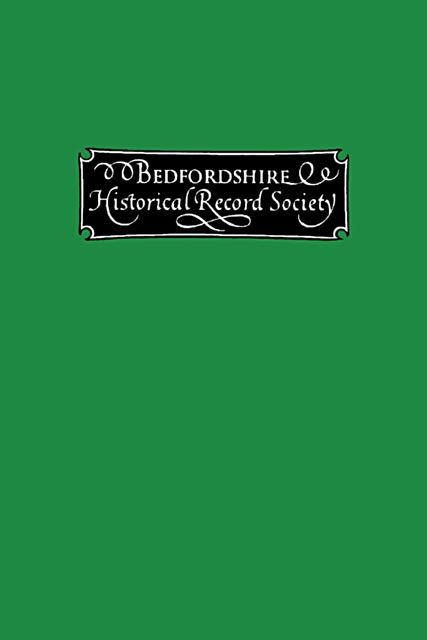Book contents
- Frontmatter
- Contents
- Abbreviations and Symbols
- The Shefford Beaker: circa 1800 B.C.
- The Morteyn Family in Bedfordshire
- The Shire of Bedford and The Earldom of Huntingdon
- The Later Descent of Wingate of Harlington
- The Disseisins by Falk de Breauté at Luton
- An Elizabethan Inquisition Concerning Bondmen
- Roll of The Justices in Eyre, 1240
- A List of Bedfordshire Apprentices: 1711 - 1720
- The Commune of Bedford
- Addendum I. “The Shire of Bedford and The Earldom of Huntingdon.”
- Addendum II. “The Disseisins of Falk de Breauté.”
- A Hand List of The Bedfordshire County Muniments : Prepared by The County Records Committee
- Index
An Elizabethan Inquisition Concerning Bondmen
Published online by Cambridge University Press: 14 July 2023
- Frontmatter
- Contents
- Abbreviations and Symbols
- The Shefford Beaker: circa 1800 B.C.
- The Morteyn Family in Bedfordshire
- The Shire of Bedford and The Earldom of Huntingdon
- The Later Descent of Wingate of Harlington
- The Disseisins by Falk de Breauté at Luton
- An Elizabethan Inquisition Concerning Bondmen
- Roll of The Justices in Eyre, 1240
- A List of Bedfordshire Apprentices: 1711 - 1720
- The Commune of Bedford
- Addendum I. “The Shire of Bedford and The Earldom of Huntingdon.”
- Addendum II. “The Disseisins of Falk de Breauté.”
- A Hand List of The Bedfordshire County Muniments : Prepared by The County Records Committee
- Index
Summary
In England, during the fifteenth century, a social change of importance was virtually completed. Tenure in villeinage with its heavy labour services and less frequent money payments becomes metamorphosed into copyhold tenure with comparatively few labour services but increased monetary obligations. But the decay of villein tenure must not be interpreted as being automatically accompanied by the decay of villeinage : the status survived as late as the reign of James I.
This survival of unfree status was the subject of a paper by the late Dr. Savine, who emphasised the fact that Tudor legal publications treated villeinage in much the same fashion as Bracton dealt with it in the thirteenth century. More important still, it was discussed at some length in technical manuals prepared for the guidance of surveyors and the stewards of manorial courts. Of most importance was the evidence which he obtained from manuscript sources, for he “found bondmen in twenty-six English counties and at least in eighty manors… It is difficult to count the families; but certainly the table contains something above five hundred different families… From Elizabethan surveys and commissions of enfranchisement, excluding the bondmen of the Glastonbury Survey, some two hundred and fifty families remain to be accounted for.” The words ‘commissions of enfranchisement’ are significant: it is largely from these sources that our information regarding Elizabethan bondmen is forthcoming. But the desire for manumission came not from below; it was not the granting of prayers of peasants labouring under disabilities; it arose largely from circumstances that the sovereign or her nominees were in need of money, and the compulsory enfranchising of a few bondmen was regarded as an opportunity for filling a depleted purse. The status of villeinage in Elizabethan England, which otherwise might have vanished with no comment, tended to be perpetuated in the interest of the owners of the manors to which villeins were held regardant or inseverable from the manor, and that interest was centred in the sum which could be squeezed from them, should occasion demand.
In 1572, Burghley wrote to the Earl of Leicester, I do send your L. a bill signed by the Q. Mate for Sr H Lee Wch the Q. Matie meaneth to bestowe uppon him unawares to himself, therefore she comaunded me to tak some care that it might be sealed, and so hir Mat might have it to give him.
- Type
- Chapter
- Information
- Publisher: Boydell & BrewerFirst published in: 2023



